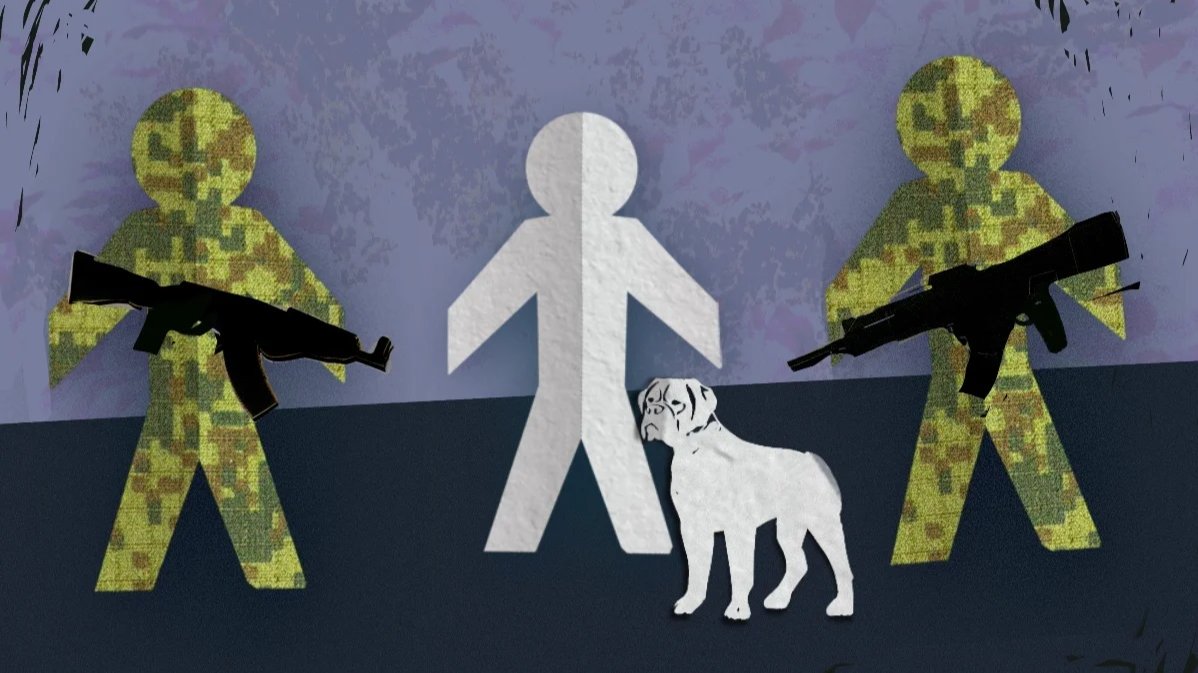Thousands of civilians from occupied parts of Ukraine are currently languishing in Russian prisons. One of those grabbed off the street in his home town in southern Ukraine’s Kherson region was Serhiy Tsyhipa, a well-known 63-year-old journalist, writer and public figure from the town of Nova Kakhovka. Tall, charming, and always stylish, almost everyone in the town knew him. He was elected to the local council three times and even after he left politics, people continued to come to him with their problems.
Nova Kakhovka was occupied within hours of Russia invading Ukraine on 24 February 2022. Tsyhipa, a veteran and a reserve major in the Armed Forces of Ukraine, had worked for the KGB in Soviet times. That morning, having heard that war had broken out, he went straight to the enlistment office to take up arms and defend his town, but was told the staff had gone to Kherson to procure weapons. They took his name and phone number and said they would get back to him.
“We packed backpacks not to evacuate, but so we could go and live in the basement,” his wife Olena recalls. “I packed large candles, matches, food, sleeping bags.”
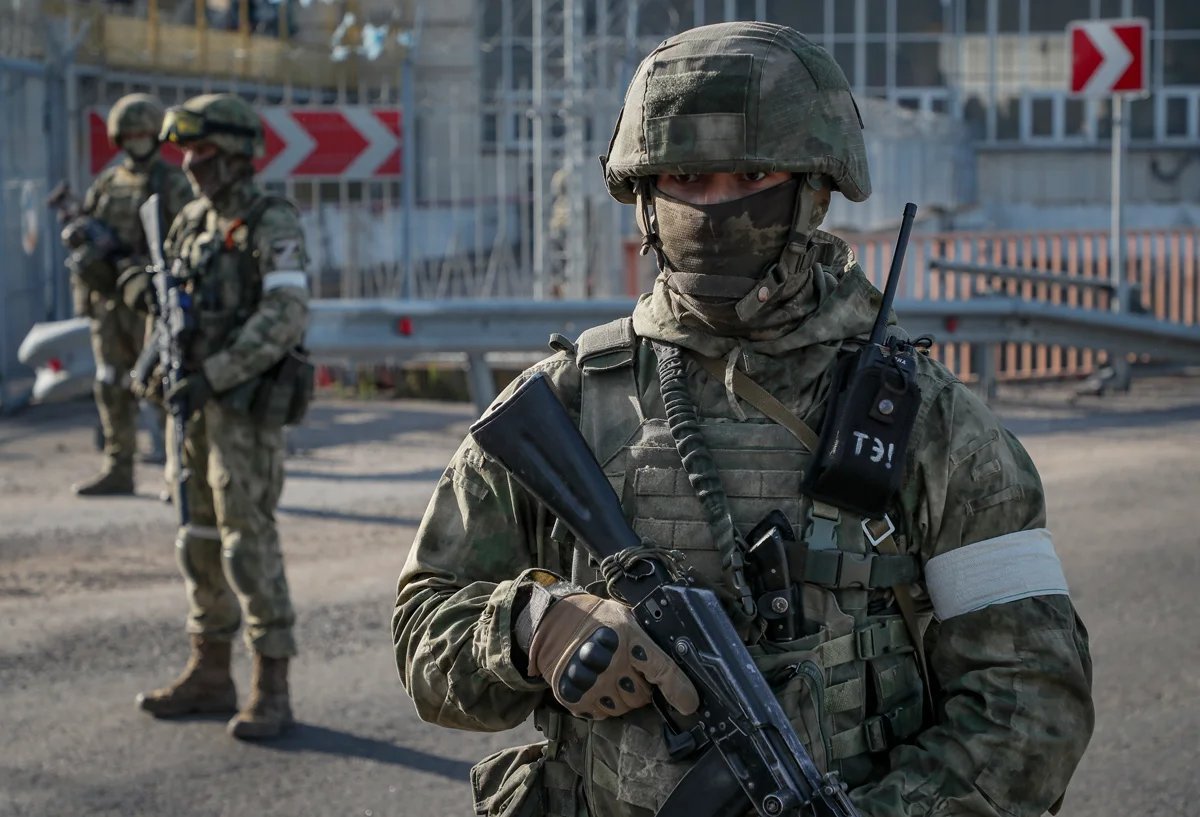
Russian soldiers at the Kakhovka dam, 20 May 2022. Photo: Sergey Ilnitsky / EPA-EFE
Having heard nothing several hours later, the couple returned to the enlistment office together only to find it closed, with no notice on the door. They went to the city council building. Some councillors were sitting in the foyer. They said that they had been called to an emergency meeting and hoped that would clear things up, as they didn’t know what to do themselves.
By noon, helicopters were circling over the dam and a Russian flag had been raised over the council building. The door of the police station was wide open but there was nobody inside.
“That was when we realised we were occupied,” says Olena. “I was so shocked … but Serhiy quickly came to his senses and decided that if there were no weapons, he would wage an information war instead.”
Tsyhipa wrote extensively about life in occupied Nova Kakhovka and posted his reports to his social media accounts. As soon as the war began, there was a series of pro-Ukrainian rallies in the Kherson region, the largest of which were in Kherson and Nova Kakhovka. Serhiy was actively involved in the rally in Nova Kakhovka on 6 March and recorded footage of people protesting the Russian invasion.
Taken and leaving
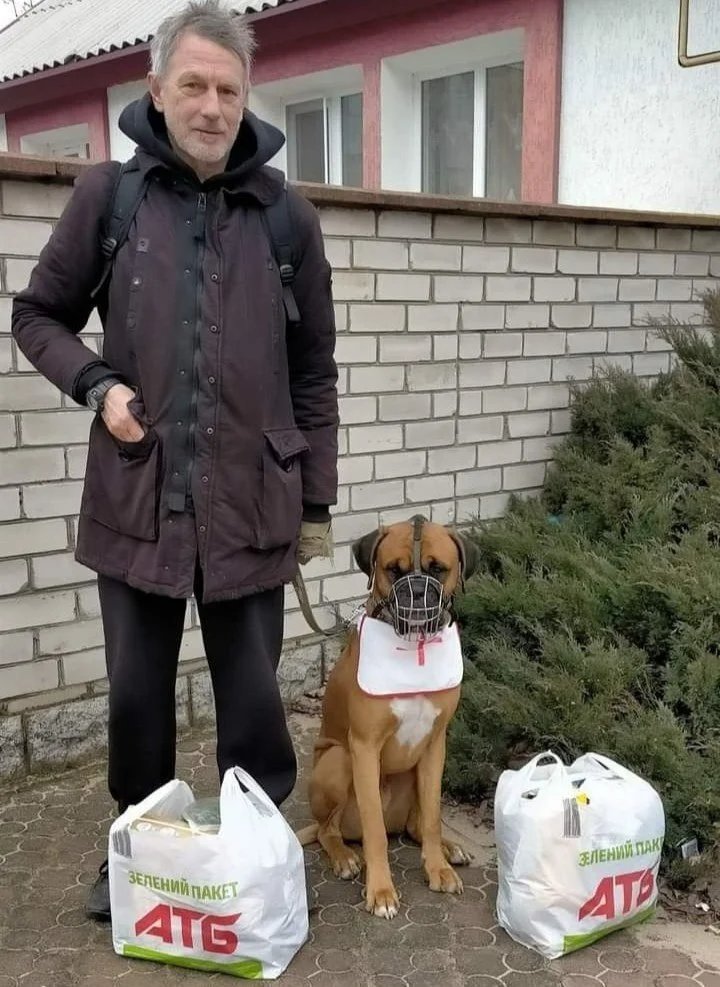
Serhiy and the Tsyhipas’ dog, Ice, who was taken along with Serhiy. Photo from private archive
“We’d only been married for six months when Seryozha was taken,” Olena says quietly. “He recently wrote from custody: ‘Lena, we’ve now been apart for longer than we were together as man and wife.’”
Serhiy was abducted by Russian soldiers manning a checkpoint on the North Crimean Canal on 12 March 2022. Serhiy had been crossing the canal to reach Tavriisk, a small town near Nova Kakhovka, when the soldiers stopped him. Nobody informed his family.
Lena received a phone call the following day from an eyewitness who said they had seen Serhiy with their dog at the checkpoint. She says “I realised he must have been stopped deliberately, as they probably knew who he was and what he did. They went through his things and checked his phone to find some reason to detain him.”
Olena found their dog, who had been left behind with Russian soldiers at the Nova Kakhovka council building on 14 March.
By mid-spring, Lena, her child and mother-in-law, had decided to leave the area. She asked an acquaintance, Oleksandr, to look after their dog, assuming that they would be back within a couple of months. However, she later learnt that Russian troops came and took both Oleksandr and the dog away and their whereabouts still remain unknown.
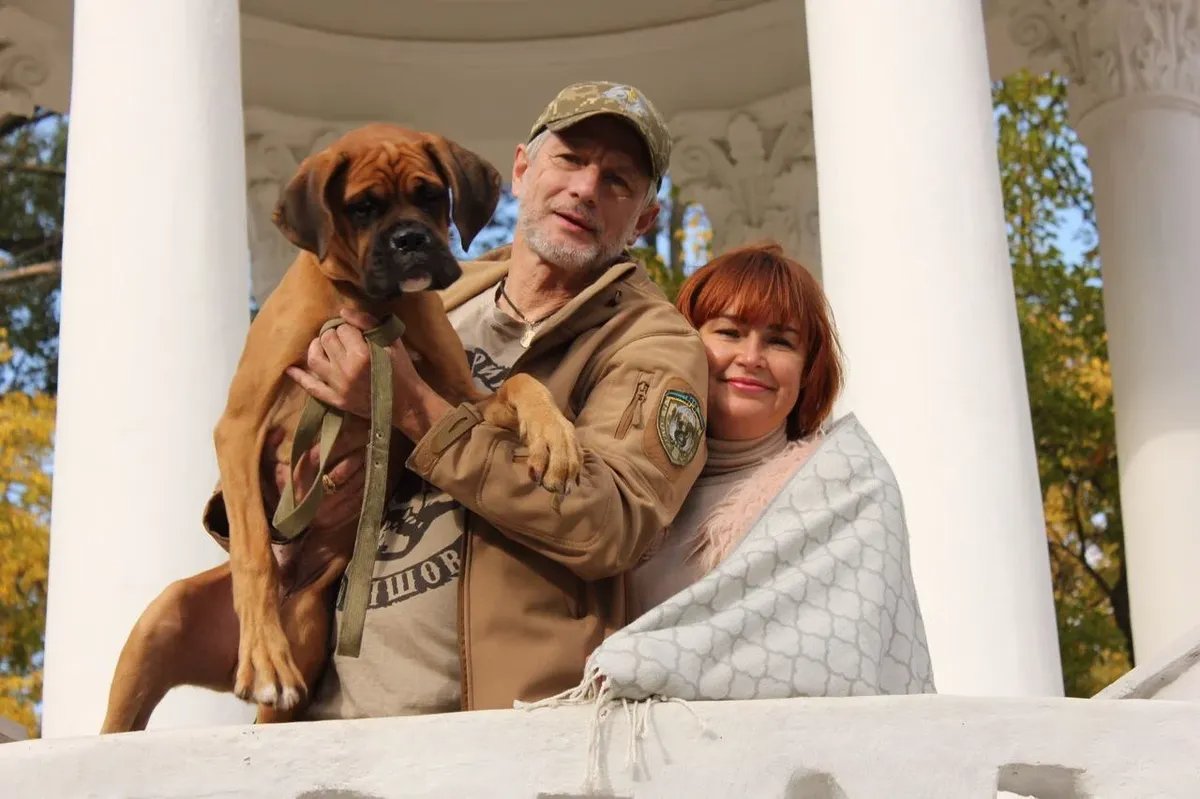
The Tsyhipas shortly before the invasion. Photo from private archive
The Tsypihas first went to Zaporizhzhia, where volunteers set up a large camp in the city for refugees, meeting arriving buses and handing out vouchers for food and accommodation. They took the refugees to kindergartens and schools where everything had been prepared to receive new arrivals from Russian-occupied areas. The next day, the Tsyhipas left for Kyiv.
Once there, Olena began to write to whomever she could, seeking out journalists who could help her husband’s disappearance to as much publicity as possible. She attended international conferences and spoke to delegates about what was happening in the occupied territories while begging, demanding, that something be done to rescue her husband.
Signs of life
Olena got her first Serhiy update from another man she knew who had been abducted in Kherson and taken to Simferopol, Crimea’s second city. He returned home in May and via friends said that Tsyhipa was alive as he had heard his name during roll call and later briefly saw him in the prison yard. Olena at least knew her husband was still alive.
When asked where Serhiy was, he replied, “You know as well as I do”.
When the Tsyhipas arrived in Kyiv in July, Serhiy’s eldest daughter from a previous marriage received a call on Telegram from an unknown number. He told her that her father would be released soon, but that certain items including his ID were necessary for that to go ahead.
Olena called the number back: nobody picked up, but he did write. Olena explained that she had no relatives in Nova Kakhovka, and needed time to find someone she knew who could take Serhiy’s things to him. The unidentified man asked her to provide Serhiy’s ID, passport, military ID and state awards. She felt unease at the list of things she was being asked to provide for her husband’s release and asked who was asking. He said he worked for the Russian police, but didn’t give his name.
When asked where Serhiy was, he replied, “You know as well as I do”.
Olena started to look for someone to take the required things and hand them over to the security forces in the city. Having said where to meet, the “policeman” then kept asking her to provide him with the ID details of the “courier”.
“I was wary. Why would they need that?” she recalls. “He’s just there to hand over the parcel.” The man on the phone then accused her of creating a fuss and said that they would detain and interrogate whoever brought Serhiy’s documents anyway.
Olena demanded she be allowed to speak to her husband on camera. She wanted to hear from him directly which documents were required for his release as she was unwilling to risk the safety and freedom of another person otherwise. At this point, the correspondence ceased.
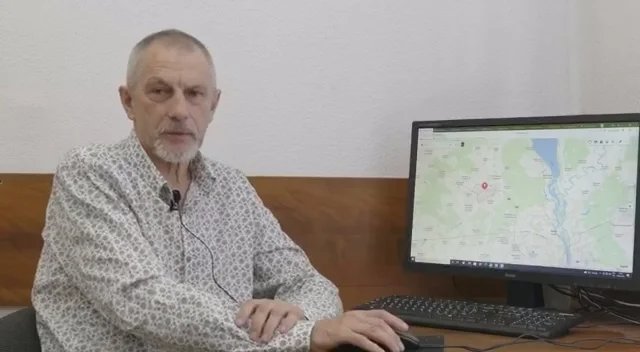
Tsyhipa on video footage from the Beregini Telegram channel
She received another call on 3 September. A man she didn’t know passed on greetings from Serhiy, saying he was alive and she just had to be patient. A month later, he called again, asking if Serhiy was home. He sounded surprised when he heard he wasn’t. He went silent, then put the phone down. He called again and Olena suggested he tell journalists his story but he refused, explaining that he still had a friend in captivity and couldn’t put his life in danger. He eventually managed to get his friend released, perhaps by paying his captors money, but Olena cannot say for sure. The man didn’t give his name, but spoke a lot about Serhiy, and was in awe of the fact that, despite the torture, he refused to cooperate with the Russians.
A video appeared on the Beregini Telegram channel, run by a group of pro-Moscow hackers, on 22 April 2022, in which a much older-looking Tsyhipa admits to being a former high-ranking psyops officer within the Armed Forces of Ukraine.
“In that video, Serhiy is wearing someone else’s shirt. … When they arrested him, he was in a black hoodie,” says Olena. “I know that they washed him, cut his hair, tidied him up and put fresh clothes on him to film him. Later, I spoke to Oleksandr Tarasov, a journalist from Kherson, who was taken to Simferopol on 17 March 2022 with my husband. Tarasov said that Seryozha was severely beaten but still refused to be filmed. Then the Russians threatened to bring his wife, mother, daughter and grandchildren to the pretrial detention centre and do the same thing to them while he watched. He had no choice.”
Spy in his own country
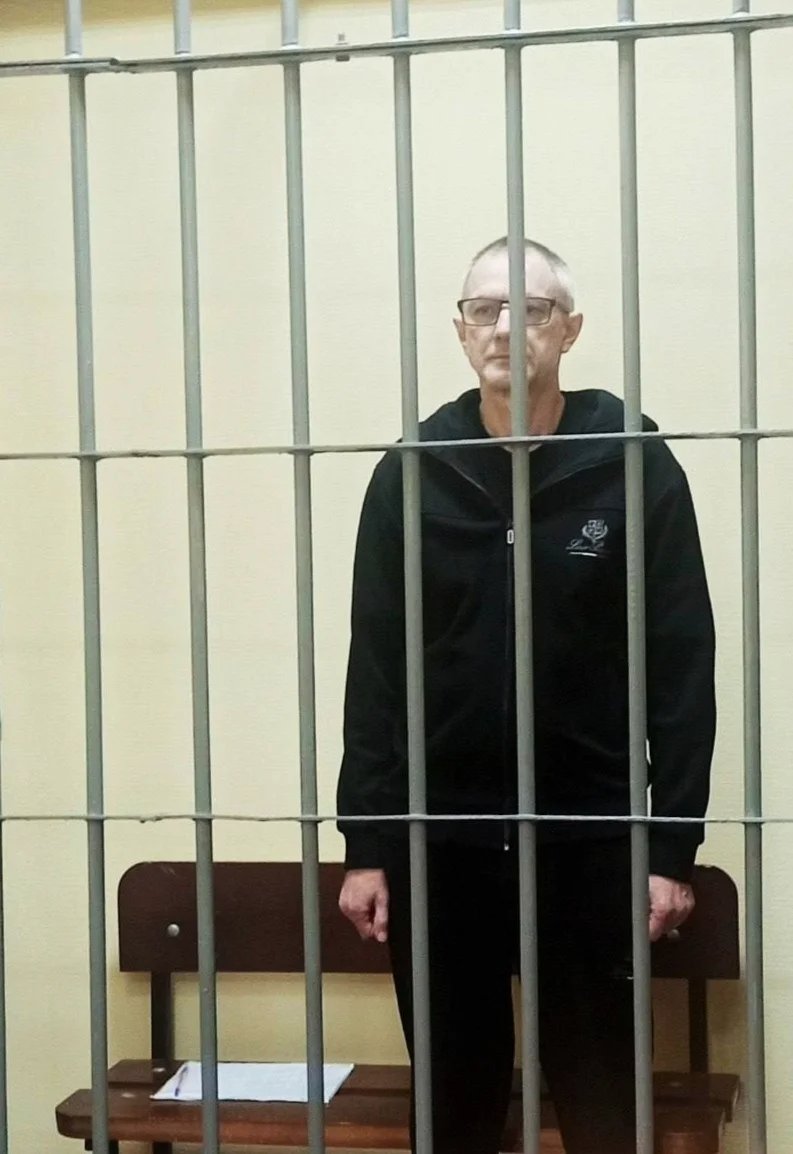
Serhiy Tsyhipa at the court hearing. Photo from private archive
Olena managed to find a lawyer, Renat Yunus, to defend Serhiy in Crimea in October 2022. The lawyer sent multiple requests to the FSB just to find his client.
Later that year, he called Olena and said that Serhiy had been beaten after they searched his cell and found a poem in Ukrainian, adding that he had still not been allowed to see his client. Lawyer and defendant met for the first time at a court hearing in August 2023.
Tsyhipa was charged with spying for his own country’s security services in the Kherson region and gathering data on Russian troop movements. He was found guilty of espionage on 6 October 2023 and sentenced to 13 years in a high-security prison. An appeal was heard in February 2024, but the verdict was upheld. Tsyhipa is currently serving his sentence in the town of Skopin, in central Russia’s Ryazan region.
*
Olena goes to every demonstration she can to raise awareness of the plight of civilians in Russian prisons, and says that talking with the wives, mothers and sisters of other men who have ended up in Russian captivity helps her cope with her own pain.
“Of course Serhiy never expected war to break out and that he’d end up in captivity,” Olena says. “But nor did he expect that Ukraine wouldn’t fight for him if he did. He writes: ‘Lena, go and speak to the president … write to this person, to that person… For God’s sake, I’ve done all that, more than once.”
“I try to focus on myself now,” says Olena. “I need to be strong for when my husband comes home.”
